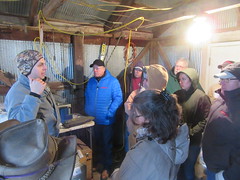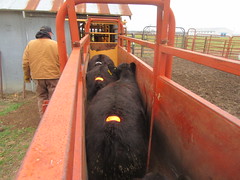University of Missouri's Southwest Research Center near Mt. Vernon hosted an open house December 3rd that gave attendees a peek at the direction beef cattle research is taking at the 890 acre Center.

Dr. Jordan Thomas, MU Extension beef reproduction specialist, led the presentations by asking if producers think they can afford not to use technology. Specifically, he mentioned estrus synchronization and artificial insemination.
"The genetics of the AI bred calves allows producers to be competitive with the best herds in the country due to the use of elite bulls with higher accuracy expected progeny differences (EPD)," said Thomas. "The protocol results in more early-born heifers that are more likely to conceive earlier and remain in the herd longer."
That longevity adds to herd profitability over the females lifetime. Their early-born steer mates will also be heavier than those out of a natural service sire that's born late in the calving season.
Dr. Jared Decker, MU Extension beef genetics specialist, followed with a strong pitch for beef cow owners to adopt EPD when making sire selections.
"When you go to a bull sale you should be there to buy genetics, not environment or management," said Decker. "EPDs should be used for the long run because they work."
Decker shared data from the University's Thompson Research Center at Spickard where technology allowed them to make impressive progress in growth and carcass traits. For example, weaning weight has increased an averaged of 1.5 lbs. per years. The percent of carcasses grading Choice and Prime has also made dramatic improvement.
Under Decker's and Thomas's leadership the current Angus, Simmental and Hereford, 115 cow herd at the Southwest Center will transition to a Red Angus, Hereford cow base focused on fertility and profitability. Later a terminal crossbreeding program will use Simmental and/or Charolais bulls. Economic selection indexes, stayability, and heifer pregnancy will be the focus of selection decisons. Decker and Thomas along with Southwest Center Superintendent David Cope say they intend to get more females bred and improve the fertility in the growing cow herd.
"The big EPD driver in selection is stayability as they target optimum cow size and milk on fescue in a fall calving system," said Cope.
Eldon Cole, MU Extension field specialist in livestock, wrapped up the classroom session with a review of the Missouri Show-Me-Select Heifer Development Program. SMS effort encourages participation in technology as producers add value to good beef heifers. The added value comes via genetic selection using EPDs, genomics, heat synchronization, ultrasound pregnancy test use, sexed semen, use of accepted health protocols and economical nutrition featuring optimum use of available forages.
The event concluded with attendees moving to the north part of the center. There, Thomas led the demonstration of artificial insemination of 35 yearling heifers that had been synchronized using the 14-day CIDR protocol. A heat detection patch had been placed on the heifers' rumps and if that morning the patch indicated they had been ridden sufficiently they were inseminated. Eight heifers did not have their patches worn adequately and they were held over and bred 24 hours later.
For more information, access beef educational programs through the nearest MU Extension field specialists who specialize in answering beef production questions using research-backed information. This includes Eldon Cole in Lawrence County, (417) 466-3102; Andy McCorkill in Dallas County at (417) 345-7551; Dr. Randy Wiedmeier, in Ozark County at (417) 679-3525; or Dr. Patrick Davis in Cedar County at (417) 276-3313.





Comments
Via Email : chiefdrlucky@gmail.com
Thank you all for reading,
God bless"